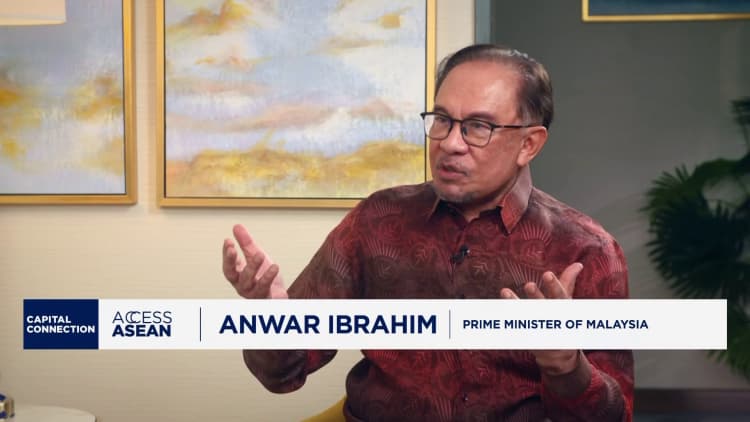The Johor BahruSingapore Rapid Transit System (RTS) Link under construction near the JB Sentral building in Johor Bahru, Malaysia, as of Tuesday, Sept. 24, 2024.
Bloomberg | Bloomberg | Getty Images
Sharon Kuok started studying in Singapore when she was seven, commuting daily to and from her home in the southern Malaysian state capital of Johor Bahru.
She subsequently attended the National University of Singapore, and she then worked in the city-state for over 30 years before she finally called it a day.
She’s now back in her hometown where she lives with her Singaporean husband and their three dogs in a two-story semi-detached house. Despite eating out most days and having a grocery list that included a lot of imported items like milk and cheese, their monthly expenses are about 30% to 40% lower compared to when they were in Singapore.
“We felt that Malaysia would be a cheaper place to spend our retirement. We picked JB [Johor Bahru] because that’s where I am from and for its proximity to Singapore,” she said.
Kuok is among the small but growing number of Singapore residents who have moved to Johor where living costs are much lower. Some, like Intan Syuhada, senior director at events company Messe Berlin Asia Pacific, base themselves in Johor but cross over to Singapore for work daily via one of the two bridges that connect the two sides.
Mercer, a HR consultancy, earlier this year ranked Singapore the second costliest city in the world for international workers to live in, while Johor Bahru came in at number 214 out of the 226 cities on the list. Items that cost a lot more in Singapore include cars, petrol and utilities like electricity and water.
Already, many people from Singapore have started visiting the Malaysian state regularly to shop and to enjoy services from car repair to massages and haircuts.
The number of Singaporeans visiting or relocating to Johor could increase in coming years when a rail link between Singapore and Johor Bahru is completed and the planned Johor-Singapore special economic zone (JS-SEZ) takes effect.

Passport-free travel
First mooted in January 2024, the JS-SEZ will allow passport-free travel and digitized cargo clearance between Singapore and parts of Johor including Johor Bahru, significantly shortening the time taken for people and goods to move across the border.
Singapore will benefit from smoother access to Johor’s ample land and cheaper manpower, while Johor and Malaysia will gain new investments that can potentially result in higher-paying jobs. According to Johor officials, the JS-SEZ could create as many as 100,000 new jobs in the state and beef up the Malaysian economy by around $26 billion per year for the next six years.
A general view of the bumper to bumper traffic as vehicles are seen crossing into Singapore a day ahead before Malaysia closes its borders at the causeway bordering Malaysia’s southern state of Johor Bahru and Singapore on March 17, 2020 in Singapore.
Suhaimi Abdullah | Getty Images
Malaysia had hoped to finalize the agreement by September, but Singapore media, quoting sources, said the deal had been held up due to several sticking points such as contributions to a facilitation fund for companies looking to expand operations to Johor and rules regarding the movement of skilled workers.
The two countries are now looking to seal the deal in December when leaders from both countries are scheduled to meet.
Rapid transit system
Movement between Singapore and Johor will be facilitated by the upcoming rapid transit system (RTS) linking northern Singapore to Johor Bahru. The system is slated for completion before the end of 2026 when it will be able to carry up to 10,000 passengers per hour in both directions, cutting travel time to just minutes from more than an hour.
“The RTS will make a massive difference because the Johor-Singapore border has one of the world’s highest volumes of human traffic. Just having two land links is not going to work if the JS-SEZ is to be a success,” said Hasan Jafri, a Singapore-based analyst who advises investors about regional politics and policy issues.
Currently, more than 300,000 Malaysians commute daily to Singapore where wages are typically three times higher, braving traffic jams and cumbersome custom and immigration checkpoints that could take several hours to clear at certain times.
As a result of this bottleneck, very few Singapore-based companies use Johor for activities that are time sensitive due to the potential for disruptions in the supply chain.
Historical baggage
Singapore and Johor had attempted to better integrate their economies in the past, but cooperation was hindered by animosity between some previous Singapore and Malaysian leaders. Malaysia saw itself as a competitor to Singapore at that time and wanted to build its own ports and high-tech industries, while the city-state was only prepared to shift lower value-added activities to its northern neighbor.
“Now the dynamics are different. Economically, Singapore has widened the gap with Malaysia, while Malaysia has remained stuck in a middle-income trap with competition emerging from Vietnam and India. To move up the value chain, Malaysia needs to work with Singapore,” said Jafri.
That said, the smooth functioning of the JS-SEZ could be hindered by domestic pressures if the greater movement of people result in a sharp fall in Singapore retail sales and rising inflation in Johor. Singapore businesses thinking of moving to Johor must also consider risks stemming from Malaysia’s inefficient bureaucracy.
A view from Singapore of the border crossing into the Malaysian southern city of Johor Bahru.
ROSLAN RAHMAN/AFP/Getty Images
Singapore retail sales could fall by 3% to 4% once the RTS is completed, according to one piece of research, as residents do more of their shopping and entertaining in Johor. Meanwhile, Johor residents such as Kuok and Intan fear a surge in visitors and migrants from Singapore will stoke inflation as well as change the living environment.
“I would not be comfortable if JB becomes like Singapore, because that would mean a persistent rise in the cost of living,” Kuok said.
“I strongly believe JB has to maintain its own character and being messy and inefficient is one of its charms.”











